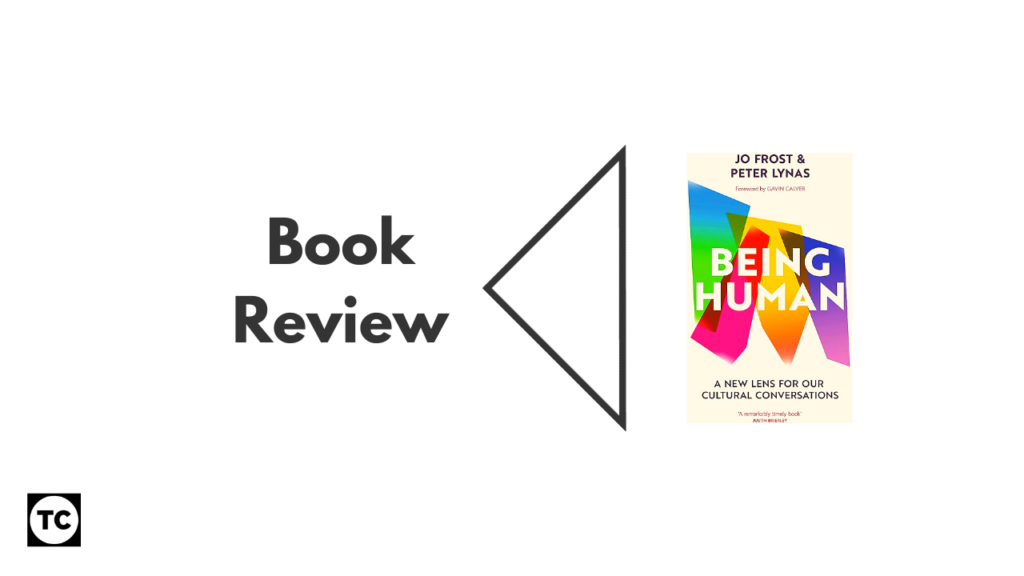I recieved a copy of this book from the authors – I hope that doesn’t cloud my review!

At the outset of this review it’s worth noting a few points of contact with the various aspects of this book, including authors, one of whom is a friend and the other I hope will be, as well as the organisation they both work for, The Evangelical Alliance, of which the publisher I work for, IVP, is a member. I’m also fascinated, theologically speaking, with the titular topic – I’d love to pursue a systematic theology PhD around the question of what it means to be human. This book, though, is more ambitious than just talking about what it means to be human (which is a vital task!). As well as that, the clue comes in the subtitle, ‘A new lens for our cultural conversations’ – this is a book about culture and the conversations that shape and form it. The cover made little sense to me until the lens image started to become clear through the book – I think the four abstract shapes represent the four outer parts of what the authors call ‘the being human lens’, which then provides a shape to the book. So now, having read the book, I think it is a really good cover! Hodder are to be commended for producing a nice little book, with the design element of the lens tying it together, amongst all the words.
Let’s get the quibbles out of the way first. As I noted on Twitter, if this was a book about cultural engagement I’d give it 4.5 or 5 out of five, as I think it is winsome, wise, and clear on the important things. It is also a very readable book! But there is also a fair bit of theology here, around what it means to be human, and some of that could be sharper. That also leads to my biggest beef – endnotes. I’m sure this is one of those books where there were lots of discussion about endnotes (At the end of the book) or footnotes (for the bottom of pages), but having read and enjoyed this book, it definitely wanted footnotes, to help those looking for references, and seeing where ideas are coming from. By and large I agreed theologically with what the authors were saying – but minor niggles became harder to ignore when we got to nearly the final part of the book, ‘participation’. Theologically speaking, participation means something – and it wasn’t clear if the authors were riffing off that idea to focus exclusively on the aspect of partnering with or serving God in the renewal of creation, but I think the theme of participation in God, perhaps more easily parsed as ‘Union with Christ’, could have been made clearer, and would have strengthened the book. That also would have given a bit more weight to the various statements that everyone‘s humanity matters – participation and Union with Christ are not primarily about us doing things, but resting in and enjoying what Christ has done. I was glad to see particularly an affirmation of the importance of embodiment to our humanity – for example, “the incarnation affirms the body’s original goodness” (p. 163 – though the point could be and is elsewhere widened to creation).
As I say, though, I think this is not primarily a theological book, I think it is a cultural one. The authors are (Rightly) using the language of imago dei to talk about how Christians are to be human in the world, and this is useful in our polarised world. The authors take the orthodox, calm and clear positions that I’ve come to expect, but do so in a winsome and readable way – I wonder if this would be a good book for American friends to read, and to ponder giving to those (not all) who are ‘deconstructing’ and wondering if ‘evangelicalism’ has anything to offer. Closer to home, Frost and Lynas do a good job of explaining and unpacking cancel culture, without straying into either side of calling it a good idea or a thoroughly terrible thing. This is a book of useful nuance.
This is also a thoroughgoingly Christian book, in the activist/contemplative sense. I appreciated – as the authors explain in the introduction – the insertion of various points and kinds of reflection throughout. Unlike what I experienced as the slightly gimmicky ‘hot takes’ mechanism at the end of chapters of Chris Watkin’s ‘Biblical Critical Theory’ (review under way!) these blended pause, prayer and thoughtful questions, as well as useful suggested further reading. Whilst the bulk of the book would, I think, be thoroughly readable by someone who isn’t a Christian, these practical and prayerful features make it really valuable for those of us pondering how to bring our theology carefully into the public square. Whilst overall, as I say, it isn’t quite the theological book I wanted, it is an excellent book about cultural engagement through a ‘being human lens’, and so I’d recommend it for that.
4/5
Leave a Reply